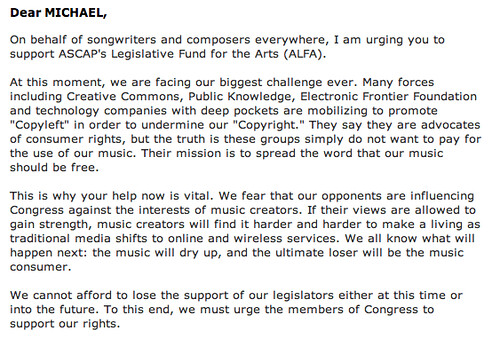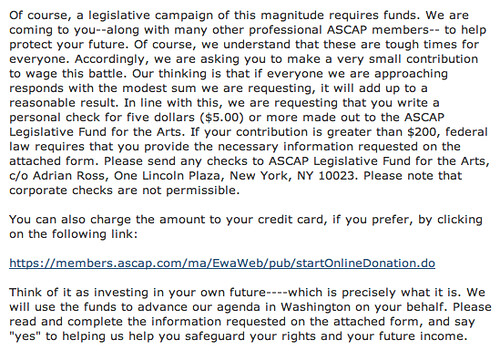from the where-should-he-send-the-check? dept
Last week, I wrote about Mark Helprin's
error-filled Wall Street Journal op-ed that was really just an attempt to generate attention for his new book -- attacking everyone who criticized his 2007 NY Times editorial. I, of course, am
one of those who challenged Helprin's reasoning at the time. Of course, as much as I write about this stuff, I'm no Larry Lessig or James Boyle, and I certainly never expected that Helprin would even bother to read what I wrote. And, as I've been reading his dreadfully written book, I didn't notice anything to indicate that Helprin was directly addressing any of the points I raised.
However, I was just reading Larry Lessig's
long and thorough takedown of Helprin's book, and noticed something odd. Early on, Lessig states:
The product of this feeding, Helprin suggests, is just so much trash. The work of the Internet is an intellectual waste. No serious reader, or especially writer, should pay any attention to this waste.
But then here's the astonishing fact about Digital Barbarism: Though the Internet is a waste, though blogs are "subliterate" and wiki's are written "the way Popeye speaks," Helprin draws exclusively upon the Internet to form the knowledge he needs to launch his attack. He cites no book, or scholarly article, that might help explain the copyright puzzle that started him on his odyssey. Literally everything he points to to explain the weirdness that is copyright is either a blog, or a wiki, or an essay in an Internet publication.
Now I like the Internet as much as the next guy, and I guess I had never really had to think about the question before. But Helprin has convinced me that you can't understand the subject of copyright law by simply reading blog posts. To get it, or at least to get it well enough to write a frakking book about it, you're going to need to read something other than techdirt.com.
Emphasis mine -- obviously. Now, while this might seem like a bit of a slap at Techdirt, I actually agree -- wholeheartedly. I certainly hope that no one gets their copyright education solely from
any blog, whether it's written by me or by William Patry. However, it struck me as odd that Lessig specifically called out Techdirt, seeing as I hadn't even noticed us being mentioned at all in the 1/2 (or so) of the book that I've gotten through (and I've never spoken to Lessig, nor seen him mention Techdirt in the past). So, I pulled out my copy of the book, and went to look at the endnotes for the first time... and realized that a rather large number of the quotes that Helprin spends his time deriding are pulled from Techdirt. But not from what I wrote... but from the comments (which he refers to, oddly, as "sections").
Now, I'll be the first to admit that we have all types of folks who show up in the comments -- from incredibly intelligent knowledgeable experts in the field of copyright law to interested amateurs to the totally clueless to trolls. To pick and choose a few crazy comments, and position them as if they're
representative of the common views of folks questioning Helprin's logic, is incredible. I could equally pick out some of the more ridiculous pro-infinite copyright comments on Techdirt, and make the same nutty claims about those who support stronger copyright laws. Just yesterday, someone
wrote in our comments:
There is never a proper debate for copyright theft. If you create it, then you own it. Many countries have unlimited copyright. Maybe that's what North America should consider. If it is created by your intellect then it is yours. You may pass it along as you wish, but it is yours forever.
Now, this is all sorts of wrong, but I assume this is one incredibly misinformed individual, rather than a representative of, say, the RIAA. However, Helprin has no such qualms. He takes random comments from up and down that Techdirt post, and assumes they represent the secret agenda of groups like Creative Commons (who he refers to as an "informal" group building software to abolish copyright -- again, all sorts of wrong).
Even more amusing? With at least a couple of the comments that Helprin quotes, he's clearly taking them
totally out of context. For example, there is one point in the book where Helprin goes against people who pointed out that he had written a book called
Winter's Tale, and assumed (incorrectly) that it was based on Shakespeare's
The Winter's Tale. In it he quotes a commenter on Techdirt ("section 20") who
wrote: "So then Halpron's the guy who did the "West Side Story" job for Shakespeare's The Winter's Tale?" and uses that as evidence of us morons critiquing him. Except, he left out the rest of that comment, which made it clear that the whole thing was a joke: "Was it any good? Have they made a movie out of it yet, or was it only on Broadway?"
And, of course, even for the people who legitimately thought that
Winter's Tale was based on Shakespeare, that mistake is certainly no more egregious than the many, many, many mistakes that Lessig lays out in his review of Helprin's work -- specifically taking him to task for clearly not having bothered to read a single scholarly piece on copyright, but relying entirely on hand-chosen silly comments on Techdirt.
Among the errors are things like, "It would be one thing if such a revolution produced Mozarts, Einsteins, or Raphaels, but it doesn't," to which Lessig notes: "Helprin apparently didn't notice that none of those creators enjoyed anything like the "copyright" of today. One might as well say the world of non-copyright gave us Mozart, Bach and Beethoven, while the world of copyright gave us Britney Spears. That too would be a bad argument, but just [the] sort of argument that is at home in this book." It's actually even worse than that. Some of Mozart's greatest works were
derivative works that likely would be considered infringing today. Helprin also seems to not know what was in the last copyright extension act, known as the Sonny Bono Copyright Extension:
Helprin writes: "Previously, a copyright assigned to a publisher or a studio would remain there for all the days of its life. Now, and thanks to Sonny Bono, if it is not a work for hire (which nothing should or need be), a licensee can keep it for only thirty-five years, after which the rights return to the author, the composer, the artist, or the heir." (127). Wrong. The Sonny Bono Act didn't create the termination right. It merely extended it.
Yet, Helprin believes that a random small error (which was actually part of a
joke by an
Anonymous Coward on Techdirt) gives him proof that all copyright critics are clueless? Even if you consider the "errors" of equal magnitude, we're talking about an anonymous quick jokey comment vs. a "professional" book by one of the nation's top authors, from a top publishing house with (one assumes) an editor.
Still, the most amusing part of all, was Helprin's attempt to defend copyright infringement as being the same as theft -- an old argument, and one that's been dismantled many times (including, of course, by the Supreme Court, who famously stated: "interference with copyright does not easily equate with theft, conversion, or fraud. The infringer of a copyright does not assume physical control over the copyright nor wholly deprive its owner of its use"). However, Helprin doesn't even bother to look at the intellectual arguments around this issue, preferring to use an emotional tale from his youth about "stealing" an ear of corn in the field, arguing with a farmer about it, and then realizing the incredible importance of never "stealing" anything.
Yet, as Lessig points out:
So should Helprin have been ashamed that he stole the farmer's food. Of course he should be! What kind of confused mind would think it right to take another person's property? There are a million reasons Helprin's juvenile behavior was wrong, not the least that it would deprive the farmer of a chance to profit from the food he was growing. Helprin's taking that ear of corn meant that the farmer couldn't sell it. It is inconceivable that this should even have been a question for him.
But what's less clear is what Helprin thinks follows from this moral tale. Does he think that it shows that one can't "take" another person's words? That when, for example, I quote a sentence from Helprin's book in this review, I am doing the same thing he was doing when he stole some corn?
Of course, as Lessig then notes, the quoting is fair use -- but according to Helprin's own corn-story description of the importance of never stealing even an ear of corn, any "taking" of one's words would also be stealing. So, by that reasoning, considering how he quoted (by my count) 12 separate comments from the Techdirt story, one can conclude that Helprin clearly believes he has stolen from the commenters here twelve times. If he's willing to send us our royalty check, I'll make sure the money is distributed to our commenters. Mark, we're waiting! In the meantime, I can't wait to see what comments you guys make on this post. Be sure to provide only the best quality stuff, since it may be the raw material for Mark Helprin's next book!
Filed Under: copyright, creative commons, larry lessig, mark helprin, techdirt



